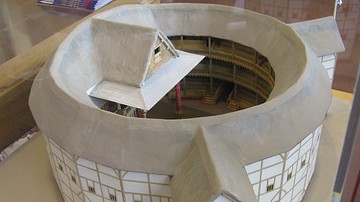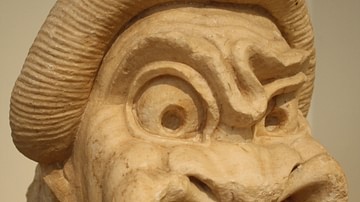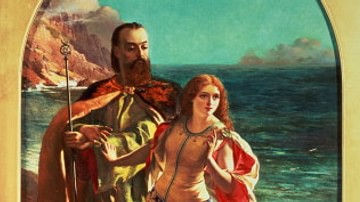
The Tempest is a play by William Shakespeare (c. 1564-1616), written in 1610 or 1611, and first performed for the court of James I of England (r. 1603-1625) on 2 November 1611. Believed to be the last play that Shakespeare wrote on his own, The Tempest deals with both tragic and comic themes, leading some literary critics to label it under the category of 'romance' or 'tragicomedy'.
Sources & Themes
Unlike many of Shakespeare's other works, there does not seem to be a direct literary source for The Tempest. Instead, it seems that Shakespeare was inspired by accounts of New World exploration, which was gaining traction during that time. Shakespeare had likely heard accounts of Ferdinand Magellan's circumnavigation of the world and had read Richard Rich's News from Virginia (1610). One of his main sources was William Strachey's A True Reportory of the Wreck and Redemption...from the Islands of the Bermudas, an eyewitness account of the wreck of the Sea Venture, a ship that went down off the coast of Bermuda in 1609. Since Strachey's full manuscript was not published until after Shakespeare's death, it is thought that the playwright had access to an early draft. Certainly, the excitement surrounding the discoveries in the Western Hemisphere provided the fabric of The Tempest's plot, even though it is narratively set on an island in the Mediterranean.
The island on which the play is set, in the words of David Bevington, is a place of "magical rejuvenation", a realm of art where "everything is controlled by the artist-figure" (818). In this way, the island itself is like a stage, and Prospero with his magic is like Shakespeare with his pen. There are several references within the play to theatre and actors, leaving some scholars to speculate that The Tempest may have been Shakespeare's way of saying farewell to his career, since it was the last play he wrote alone.
Another theme is that of colonialism, most clearly demonstrated with Prospero coming to the island, enslaving the native Caliban, and forcing Ariel to do his will. There are obvious parallels to the concurrent European colonization of the Americas, but Shakespeare's audience would have been more likely to think of the English exploitation of Ireland, which had taken an especially brutal turn. Caliban's enslavement, though presented by Prospero as necessary to prevent rape and disorder, nevertheless raises questions of oppression and control and leaves the audience to wonder whether Prospero's attempts to 'civilize' Caliban and contain his otherness has produced a worthy result.
Act I
The play begins with a violent storm at sea – the titular tempest – and a ship that has been caught up in it. Chief among the ship's passengers is Alonso, King of Naples, on his way home from Africa after his daughter's marriage to the King of Tunis. Accompanying him on this doomed voyage is an entourage including his son and heir, Prince Ferdinand; his brother Sebastian; Antonio, Duke of Milan; Gonzalo, a kindly old lord; and several other minor nobles. As the storm rocks the ship, a boatswain desperately tries to keep the vessel afloat, yelling at the frightened noblemen to get out of the way and find safety below deck – the sea, he explains, cares nothing for the name of kings. Sebastian and Antonio take offense and curse the boatswain, while Gonzalo insists they join the king and prince in prayer below deck. Suddenly, there is a cracking sound, and, believing the ship is on the verge of breaking, the terrified passengers abandon ship, as the mariners prepare to sink.
From the shore of a nearby island, Miranda, a beautiful 15-year-old girl, watches the shipwreck with horror. She turns to her father, Prospero, and begs him not to let those onboard come to any harm – for she knows that her father, a sorcerer, was the one who raised the storm in the first place. Prospero assures her that no one will drown. Indeed, it is his intention that they wash ashore, for he has a special purpose for them. For Miranda to understand his motives, Prospero decides to tell her how they first came to this barren island twelve years earlier. He tells how he was once the Duke of Milan, renowned for his intellect and book-learning. As he grew more obsessed with his studies, however, he became withdrawn from politics, leaving him blindsided when his brother Antonio plotted to usurp his dukedom. With the blessing of King Alonso, Antonio successfully raised an army and drove Prospero out of Milan. Prospero and the infant Miranda were then cast out to sea in a leaky old boat, surviving only with the help of Gonzalo, who had taken pity on them and supplied them with food, clothing, and books from Prospero's library from which he learned his magic powers.
As Prospero finishes his story, Miranda grows weary and falls asleep. The sorcerer then summons Ariel, a spirit in his service, who reports that he has done as Prospero has requested. Having caused the storm by flying around the ship and acting as wind, rain, and thunder, Ariel has ensured that the king and his entourage have safely washed ashore, dispersed in several groups; Alonso and his lords are on one part of the island while Prince Ferdinand has come ashore alone. Ariel has hidden the ship – which he has preserved – in a natural harbor on the island and has charmed the boatswain and the other mariners with a sleeping spell.
When Prospero commends Ariel on a job well done, the spirit reminds him of his promise to give him his freedom. Prospero does not take kindly to this and tells Ariel to remember that he is still in his debt – Sycorax, the witch who ruled the island before Prospero's arrival, had imprisoned Ariel in a "cloven pine" for twelve years before Prospero came along and freed him. The sorcerer does not hesitate to remind Ariel that he may still be imprisoned in the tree had it not been for him. Nevertheless, Prospero promises to grant Ariel his freedom in two days' time, if he continues to dutifully carry out his commands. Ariel readily agrees, and Prospero tells him to act like "a nymph o' the sea" and render himself invisible to all eyes except Prospero's own (1.2.303).

Miranda wakes up, and Prospero tells her it is time to visit Caliban, whom he refers to as his slave. Caliban is the son of the witch Sycorax and a native of the island. When he sees Prospero and Miranda, he curses them, asserting that "this island's mine, by Sycorax my mother, / Which thou tak'st from me" (1.2.334-335). Caliban recalls that when Prospero and Miranda first came to the island, they were kind to him, letting him live with them and teaching him how to speak and how to "name the bigger light, and how the less, / that burn by day and night" (1.2.337-338). In return, Caliban had showed them all the fresh springs and other qualities of the island, but now he regrets ever having done so. Prospero retorts that he only enslaved Caliban after he had tried to rape Miranda. Caliban replies that he wishes he had succeeded and "peopled else / this isle with Calibans" (1.2.352-353). Prospero has heard enough and orders Caliban to fetch him more firewood, else he will fill him up with painful cramps as he sleeps. Although Caliban resents taking orders from Prospero, he is powerless to resist and reluctantly obeys.
The invisible Ariel has, in the meantime, found the isolated Prince Ferdinand, who believes that his father is dead and he is the sole survivor of the shipwreck. By singing and playing beautiful music, Ariel lures Ferdinand to Prospero's cell, where Miranda catches sight of him and is quickly smitten; having seen no men besides Caliban and her father, she believes Ferdinand to be almost godlike in his beauty. Ferdinand is likewise lovestruck by Miranda, which pleases Prospero, whose plan requires the pair to fall in love. But Prospero worries that it is happening too quickly – to buy time, he accuses Ferdinand of being a spy and imprisons him, despite Miranda's protestations. He secretly thanks Ariel for bringing the prince to him before sending the spirit out on yet another mission.
Acts II & III
On another part of the island, King Alonso and his entourage have been wandering around for hours. Alonso is grieving for his son Ferdinand, who he believes to be drowned – even after one of the minor lords claims to have seen the prince swimming away from the shipwreck, Alonso refuses to be consoled and wonders "what strange fish / hath made his meal" on his son's corpse (2.1.114-115). Gonzalo tries to cheer everyone up by reminding them that they are lucky to be alive and that there are certainly worse places to have been shipwrecked. His words are met with scorn by Sebastian and Antonio, who childishly mock him. Gonzalo ignores them and begins to muse on how he would govern if he were king of the island, imagining how he would usher in a golden age. It is then that the invisible Ariel shows up and charms everyone into falling asleep, except for Sebastian and Antonio.
The two men are initially bewildered that the king and his other lords have fallen asleep so suddenly, noting that they do not feel tired at all. The wicked Antonio, never one to miss an opportunity to scheme, is quick to whisper in Sebastian's ear. Since Alonso's daughter is away in Tunis, and since Ferdinand has apparently drowned, Sebastian is now the heir to the Kingdom of Naples; all he must do is strike Alonso as he sleeps, and the kingdom is his. Sebastian is hesitant and asks Antonio about his conscience; at this, Antonio laughs and states how usurping the dukedom from his brother Prospero was the best thing he has ever done, telling Sebastian to "look how well my garments sit upon me" (2.1.274). Sebastian then agrees to join in the plot, and the two men draw their swords. At that moment, Ariel has the noblemen wake up – Sebastian and Antonio hurriedly pretend to have seen a pack of lions, which is why their weapons are out. Alonso orders the group to move on and keep their wits about.
Meanwhile, Caliban is hunting for firewood, thinking all the while about his hatred for Prospero. Soon, he hears someone approaching and, believing it is a spirit sent by Prospero to punish him, panics and falls on his face. The stranger turns out to be Trinculo, the king's jester, who has swum to the island from the shipwreck and is now looking for shelter. He is bewildered by the sight of Caliban, wondering if this creature be a man or a fish. Just then, another stranger enters – it is Stephano, the king's butler, who has floated to shore on a barrel of wine and is now quite drunk. Trinculo is ecstatic to see that his friend has survived and tries to dance with him, only for Stephano to warn him: "Prithee, do not turn me about. My stomach / is not constant" (2.2.114-115). The pair then turn their attention to Caliban, who Stephano describes as a 'moon-calf'. Caliban is still frightened until Stephano pours liquor into his mouth, and he is soon just as drunk as the butler. Stephano and Trinculo are amused by Caliban, who sees them as an opportunity to be rid of Prospero; kissing Stephano's foot, Caliban promises to be his servant.

Ferdinand is also off gathering logs, having been commanded to do so by Prospero. Believing her father is preoccupied with his studies, Miranda sneaks off to join him and asks him to stop working or to let her carry the logs for him. The two exchange vows of love and talk of marriage, while Prospero watches approvingly from a distance.
Meanwhile, Stephano and Trinculo continue to trudge across the island with Caliban, who is growing more violent-tempered. Having become annoyed with Trinculo, Caliban asks Stephano to "bite him to death, I prithee" (3.2.33). Soon, Caliban shifts his violent thoughts toward Prospero; he suggests that Stephano should murder Prospero by smashing his skull in as he lies sleeping, and then the three of them could rule the island together. Stephano agrees and tells Caliban to lead them to Prospero's cell, unaware that Ariel has been secretly listening to their plans. The spirit flies off to tell Prospero of the conspiracy but first visits the spot where Alonso and his courtiers have stopped to rest. A magic banquet appears before the exhausted noblemen, but before they can eat, Ariel makes the table vanish and conjures thunder and lightning. He appears in the form of a harpy and castigates Antonio, Sebastian, and Alonso for their treachery against Prospero before disappearing.
Acts IV & V
Prospero releases Ferdinand and gives him his blessing to marry Miranda, though he warns him not to break her "virgin-knot" before the wedding rites have been administered (4.1.15). To celebrate the betrothal, Prospero has Ariel summon three spirits to perform a masque. The spirits take the form of figures from ancient Roman mythology: Juno, queen of the gods; Iris, messenger of the gods and personification of the rainbow; and Ceres, goddess of agriculture and fertility. The spirits bless the marriage of Ferdinand and Miranda, wishing them honor and riches as well as endless bounty. Then, nymphs and reapers join the masque and begin to perform a country dance, at which point Prospero remembers Caliban's plot against his life and angrily sends all the spirits away. Ferdinand and Miranda notice Prospero's sudden anger and ask him what is wrong. The sorcerer brushes off their concerns, telling them that his outburst was merely a product of his old age. He reflects on the brevity of the masque that has just ended, comparing it to the fleeting nature of all things, including life itself:
Our revels are now ended. These our actors,
As I foretold you, were all spirits and
Are melted into air, into thin air;
And, like the baseless fabric of this vision,
The cloud-capped towers, the gorgeous palaces,
The solemn temples, the great globe itself,
Yea, all which it inherit, shall dissolve,
And, like this insubstantial palace faded,
Leave not a rack behind. We are such stuff
As dreams are made on, and our little life
Is rounded with a sleep.
(4.1.148-158).
Prospero and Ariel then go off and set a trap for their would-be assassins, hanging fine garments on a clothing line by his cell. When the three conspirators arrive, Stephano and Trinculo become distracted by the clothing and rush over to steal them, despite Caliban's insistence that they stick to the plan. Suddenly, a group of spirits rushes at them, taking the shape of hounds, and chases them off. Having dealt with Caliban, Prospero now prepares to execute the final part of his plan, promising to set aside his magic when it is all done: "I'll break my staff, / Bury it certain fathoms in the earth, / And deeper than did ever plummet sound / I'll drown my book" (5.1.54-57). Presently, Ariel enters with Alonso, Gonzalo, Sebastian, Antonio, and the other lords. They unwittingly walk into a circle that Prospero has drawn with his staff, where they are frozen by a spell.
Prospero appears before them. He speaks to Gonzalo first, his "true preserver", thanking him for his kindness and promising to "repay thy graces / Home both in word and deed" (5.1.70-71). He then turns on Alonso, Antonio, and Sebastian, castigating them for their wickedness – he dons his old robes and reveals his identity as the rightful duke of Milan. Turning to his brother, Prospero demands that Antonio give his dukedom back; not only does Antonio refuse to respond, but he hardly speaks another word for the rest of the play. Nevertheless, Prospero says he will forgive the men for their transgressions. While Alonso is shocked to see Prospero alive, he admits that he still cannot get over his grief for the loss of his son. It is at this point that Prospero shows the king into his cell, where Ferdinand and Miranda are playing chess. After Alonso's tearful reunion with his son, it is revealed that Ferdinand and Miranda are betrothed, thereby strengthening Prospero's position as duke by tying his bloodline to the king. Alonso begs Miranda's forgiveness for casting her out twelve years ago, but Prospero tells him no apologies are needed.
Ariel brings over the boatswain and the other mariners – his last task before earning his freedom – and it is revealed that the ship is seaworthy and ready to take them all back to Naples. They prepare for an evening of reveling to celebrate Ferdinand and Miranda's wedding, and Prospero decides to punish Stephano, Trinculo, and Caliban by making them clean the stolen clothing before the festivities; as he exits, Caliban finally realizes what a fool Stephano is and says, "What a thrice-double ass / Was I to take this drunkard for a god" (5.1.299-300). Prospero then turns to the king and promises to tell him about his time on the island and says that after the festivities, he will go to Milan to reclaim his dukedom and finish out his life. As the other characters exit, Prospero remains onstage to deliver an epilogue: "Now my charms are all o'erthrown, / And what strength I have 's mine own" (Epilogue 1-2). He tells the audience that, much like he had found Ariel trapped in a tree, he is imprisoned onstage and can only be freed by their applause.














